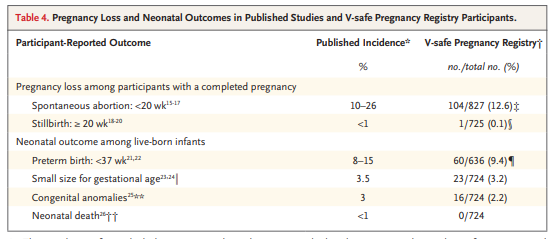
This @NEJM paper on the safety of #COVID19 #vaccines during #pregnancy found no increased risk of miscarriage associated with vaccination.
So why is this person claiming that there was an 83% rate of miscarriage?
Short answer, a maths mistake... 🧵
nejm.org/doi/pdf/10.105…
So why is this person claiming that there was an 83% rate of miscarriage?
Short answer, a maths mistake... 🧵
nejm.org/doi/pdf/10.105…

*But first* I would like to make it really clear that almost all miscarriages happen because there was something wrong with the baby that made it unviable. 1/
You cannot avoid miscarriage by being a "more careful mom" and to suggest to someone who has had a miscarriage that they should have been more careful is just cruel. 2/
Now maths!
The paper contacted 3958 people who had received COVID vaccines during pregnancy ~3 months later and found out what had happened.
712 had given birth to healthy babies.
There was one stillbirth.
And 104 miscarriages.
The rest were still pregnant. 3/
The paper contacted 3958 people who had received COVID vaccines during pregnancy ~3 months later and found out what had happened.
712 had given birth to healthy babies.
There was one stillbirth.
And 104 miscarriages.
The rest were still pregnant. 3/
The authors then want to calculate the miscarriage rate and compare it to the normal rate, which they give as 10 - 26% from historical data.
I would usually use this review and say it's between 12.5 and 18.7%. 4/
thelancet.com/journals/lance…
I would usually use this review and say it's between 12.5 and 18.7%. 4/
thelancet.com/journals/lance…
But there's a problem, which is that this rate is among all (completed) pregnancies. But because lots of people in this study are still pregnant, not all the pregnancies are completed.
There are two options for dealing with this... 5/
There are two options for dealing with this... 5/
What the authors do is look only at completed pregnancies. There are 827 completed pregnancies in the study. Divide the 104 miscarriages by 824 and you get a miscarriage rate of 12.6%, which is in that normal range. 6/ 

But hang on, you might say, a lot of those completed pregnancies were vaccinated in the third trimester. It was too late for them to have a miscarriage, so is it fair to count them into the denominator?
That's exactly what the letter that this person is quoting asks. 7/
That's exactly what the letter that this person is quoting asks. 7/

This is a fair point. So let's instead take another approach. Given that it was a 2-3 month follow-up, it's not unreasonable to assume that everyone at least completed the trimester they were in when they got vaccinated. 8/
If we make this assumption, the paper gives us all the data we need to calculate the 1st and 2nd trimester miscarriage rates separately.
1st trimester: 96 miscarriages among 1132 vaccinated = 8.5%
2nd trimester: 8 miscarriages among 1714 vaccinated = 0.5%
9/
1st trimester: 96 miscarriages among 1132 vaccinated = 8.5%
2nd trimester: 8 miscarriages among 1714 vaccinated = 0.5%
9/
Both of these ways of calculating the rate are imperfect. And given this, I can see why the authors went with reporting the conservative (ie. higher) rate.
But no matter how we calculate it, it's still not more than that normal rate of 12-5 - 18.7%.
10/
But no matter how we calculate it, it's still not more than that normal rate of 12-5 - 18.7%.
10/
So where does this rate of 84% come from? 11/
The person writing the letter has changed the denominator as follows. If there were 827 completed pregnancies, but we think it's not fair to include the 700 people vaccinated in the third trimester and remove them, the denominator is 127.
12/
12/

So, out of 127 people vaccinated in the first and second trimesters...
*who had completed their pregnancies within 3 months*
... the 84% had a miscarriage.
13/
*who had completed their pregnancies within 3 months*
... the 84% had a miscarriage.
13/
But this is a bit of a meaningless statistic, since the only way you can complete your pregnancy within 3 months, starting in the first trimester, is to miscarry. 14/
And presumably the only reason that rate isn't 100% is because some people vaccinated at the end of the 2nd trimester completed their pregnancies within 3 months by giving birth. 15/
So, from the data in this paper we can calculate the miscarriage rate on completed pregnancies as 12.6%.
Or we can calculate the miscarriage rate on (probably) completed first trimesters as 8.5%.
Both of these are no higher than normal. 16/
Or we can calculate the miscarriage rate on (probably) completed first trimesters as 8.5%.
Both of these are no higher than normal. 16/
But the quoted rate of 84% is not the miscarriage rate. It just tells us that we can't go from the first trimester to giving birth to a healthy baby in three months.
Which I think we all knew, right? 17/17
Which I think we all knew, right? 17/17
PS! I was kind of surprised the @NEJM would print a letter that was so obviously wrong. So I went looking to see if they did, and they haven't. That screenshot of the letter from Deanna McLeod is, I guess, from her end of the exchange, not NEJM's.
• • •
Missing some Tweet in this thread? You can try to
force a refresh




